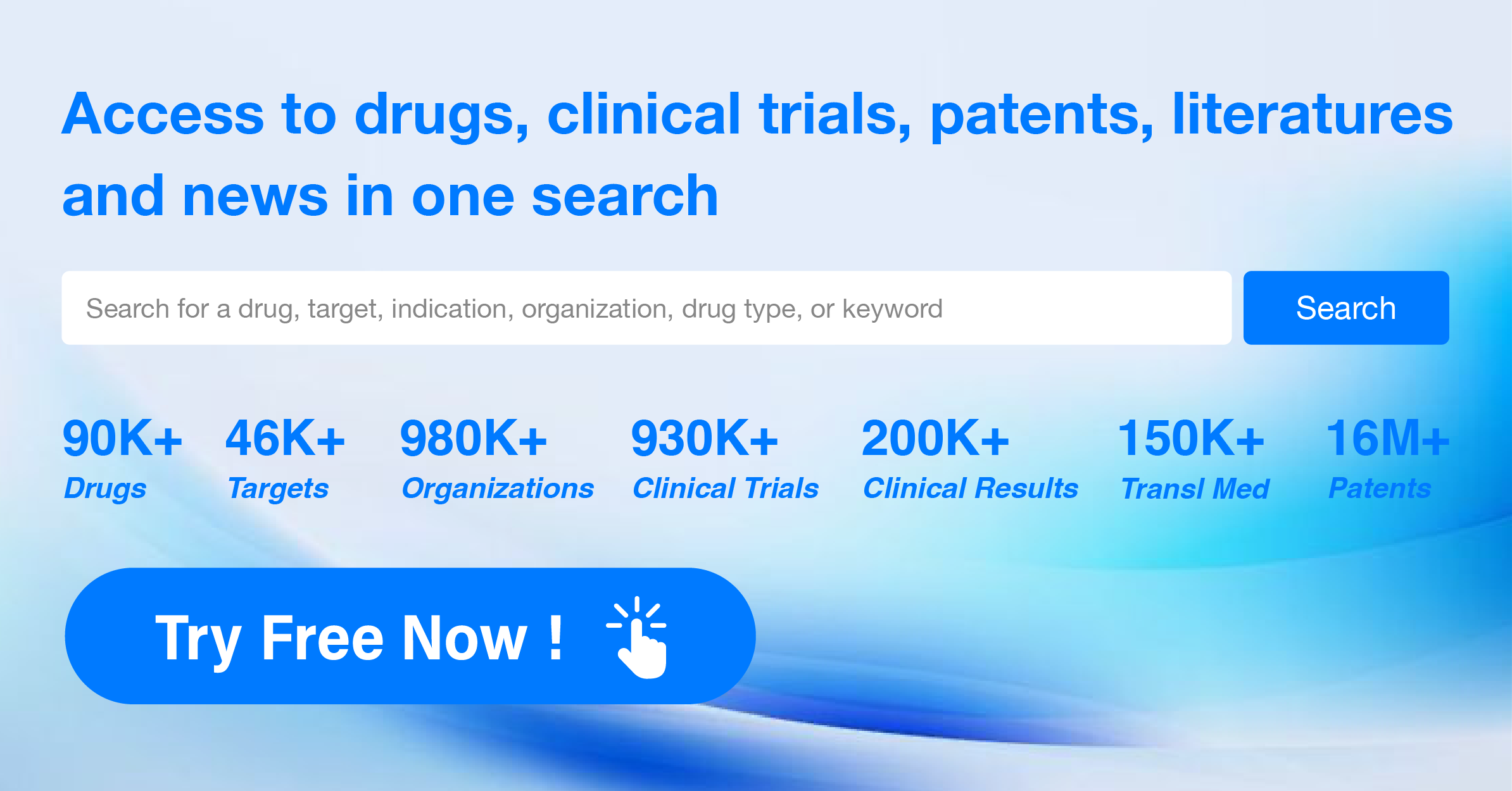Pharma Frontiers: Daily Digest of Global Pharmaceutical News – Jul 24
1.GSK's Major ADC Drug Blenrep Submits Marketing Authorization Application
On July 23rd, GSK announced that the European Medicines Agency (EMA) has accepted the marketing authorization application (MAA) for the antibody-drug conjugate (ADC) Blenrep (belantamab mafodotin) targeting B-cell maturation antigen (BCMA). The application requests approval for Blenrep in combination with bortezomib and dexamethasone (BorDex) or pomalidomide and dexamethasone (PomDex) for the treatment of relapsed or refractory multiple myeloma (RRMM). This application is based on interim results from the Phase 3 clinical trials DREAMM-7 and DREAMM-8, both of which achieved their primary endpoints, demonstrating that the Blenrep combination therapy groups had statistically significant and clinically meaningful improvements in progression-free survival (PFS) compared to the standard treatment groups.
DREAMM-7 evaluated the efficacy of Blenrep combined with BorDex compared to the current standard treatment regimen (daratumumab plus BorDex) as a second-line therapy and beyond for patients with RRMM. The results shared at an investor conference indicated that patients receiving Blenrep combination therapy (N=243) had a median progression-free survival (PFS) of 36.6 months (95% CI: 28.4-not reached), nearly two years longer than the active control group patients (N=251), who had a median PFS of 13.4 months (95% CI: 11.1-17.5). The risk of disease progression or death was reduced by nearly 60% in the Blenrep combination therapy group (HR: 0.41, 95% CI: 0.31-0.53, p<0.00001), achieving the trial's primary endpoint. Regarding the key secondary endpoint of overall survival (OS), the median OS has not yet been reached in both groups, but the Blenrep combination therapy has already shown early and significant clinical benefit (HR: 0.57, 95% CI: 0.40-0.80, p=0.00049). The OS follow-up is still ongoing.
2.Johnson & Johnson Submits Regulatory Application for Spravato CIII Nasal Spray to Treat Treatment-Resistant Depression
On July 23rd, Johnson & Johnson announced that it has submitted a Supplemental New Drug Application (sNDA) to the U.S. FDA, seeking approval for its Spravato (esketamine) CIII nasal spray as a potential first-in-class monotherapy for adults with treatment-resistant depression (TRD). Clinical trial outcomes indicate that symptoms of depression in patients treated with Spravato alone improved rapidly within about 24 hours and sustained for at least four weeks. Currently, about one in eight people globally suffer from mental illnesses, with depression being one of the most common, affecting approximately 280 million people worldwide. Meanwhile, nearly two-thirds of patients with depression do not achieve adequate relief from existing therapies. When patients with severe depression do not respond to two or more treatment approaches, it may progress to treatment-resistant depression, thereby creating a significant need for new treatment options. The submission is primarily based on the positive results from the Phase 4 TRD4005 clinical study, which evaluated the efficacy, safety, and tolerability of Spravato as a monotherapy. This randomized, double-blind, multicenter, placebo-controlled study demonstrated that within 24 hours of the initial treatment with Spravato, there was a rapid improvement in the Montgomery-Åsberg Depression Rating Scale (MADRS) total scores, which persisted for at least four weeks. The safety profile of Spravato as a monotherapy was consistent with its safety when used in combination with oral antidepressants previously, with no new safety concerns identified. Johnson & Johnson also reported last year positive outcomes from the Spravato in the Phase 3b Escape-TRD clinical trial for treating patients with TRD. Analysis revealed that patients treated with Spravato were 1.54 times more likely to achieve remission at eight weeks compared to the active control group. These trial results provide important information on the short-term and long-term efficacy of using Spravato in the treatment of treatment-resistant depression.
3.Ionis' Antisense Oligonucleotide Therapy Progresses to Critical Phase 3 Trial, with 97% of Patients Showing Symptom Improvement
On July 23rd, Ionis Pharmaceuticals announced that its Phase 1/2a HALOS study in patients with Angelman syndrome (AS) completed the multiple ascending dose (MAD) segment and achieved positive results. Analysis showed that the investigational antisense oligonucleotide (ASO) therapy, ION582, consistently improved communication, cognitive, and motor functions in patients. Up to 97% of patients receiving medium and high doses experienced relief in overall AS symptoms. Based on these positive results, Ionis plans to discuss with regulatory authorities and initiate a crucial Phase 3 study in the first half of 2025. Angelman syndrome is a severe neurodevelopmental disorder caused by loss-of-function or mutations in the maternal allele of the UBE3A gene. It is estimated that one in every 21,000 people globally suffers from this condition. Patients exhibit severe intellectual disabilities, balance and motor disorders, along with seizures and ataxia in early childhood, with developmental levels typically remaining around the ages of 4-6 years. Individuals with AS have a normal lifespan, but their lives rely entirely on caregivers. While some symptoms of AS can be improved with existing medications, there are currently no approved therapies that alter the course of the disease. The HALOS trial is a global, open-label study that included 51 patients with AS, aged between 2 and 50 years. The results presented are from the final data point of the MAD section at 6 months into the trial. Results demonstrated that ION582 treatment consistently improved key functions across all ages and genotypes of patients. By the fourth month of the trial, Bayley-4 cognitive assessment scores evaluated by clinicians showed improvements in communication, cognition, and motor functions that exceeded those observed in patients from the natural history study (NHS) of Angelon syndrome.
4.Gan & Lee Pharmaceuticals Announces Positive Phase IIb Results for GLP-1R Agonist GZR18 in Obesity Study
On July 22nd, Gan & Lee Pharmaceuticals announced positive results from the Phase IIb clinical trial of GZR18 for the treatment of obesity/overweight in adults. Patients administered with 12mg, 18mg, 24mg, and 48mg bi-weekly, and 24mg weekly doses saw an average weight reduction from baseline of 11.15%, 13.22%, 14.25%, 17.29%, and 17.78% respectively at the end of 30 weeks of treatment. GZR18 is a once-weekly injectable GLP-1 receptor agonist developed by Gan & Lee Pharmaceuticals. The drug was first approved for clinical trials by the National Medical Products Administration on October 22, 2021, and progressed to Phase II clinical stage in June 2023. At this year's American Diabetes Association meeting, Gan & Lee Pharmaceuticals disclosed the results from the Phase Ib/IIa study of GZR18 in obese patients, showing a weight reduction of 18.6% and 13.5% for the once-weekly and bi-weekly dosing regimens respectively over 35 weeks, compared to a 0.7% increase in the placebo group.
The announced Phase IIb study included 340 participants who were adults with poorly controlled obesity (BMI ≥ 24 kg/m^2) through diet and exercise, and had at least one weight-related comorbidity, or were obese (BMI ≥ 28 kg/m^2). The primary efficacy endpoint was the percentage change in body weight from baseline at 30 weeks. Specific results showed that patients treated with 12mg, 18mg, 24mg, 48mg bi-weekly, and 24mg weekly dosages of GZR18 experienced average reductions in baseline body weight of 11.15%, 13.22%, 14.25%, 17.29%, and 17.78% respectively after 30 weeks, compared to 0.99% in the placebo group. In terms of safety, the overall safety and tolerability were good, with gastrointestinal reactions being the most common adverse event, most of which were mild to moderate in severity.
5.TAEST16001 Injection of TCR-T Cell Immunotherapy Slated for Classification as a Breakthrough Therapy!
On July 22, the official website of the Center for Drug Evaluation (CDE) of the China National Medical Products Administration announced that TAEST16001 Injection, submitted by Guangdong Xiangxue Precision Medical Technology, is being considered for inclusion as a breakthrough therapy option. The treatment is intended for soft tissue sarcoma patients whose tissue genotype is HLA-A02:01, with positive expression of the tumor antigen NY-ESO-1. According to public information, this is a TCR-T cell immunotherapeutic product. Soft tissue sarcomas are a rare category of cancer that can occur in any part of the body and include over 50 different types. Developed by Xiangxue, TAEST16001 Injection is a targeted NY-ESO-1 affinity-enhanced TCR-T cell immunotherapy product, the first to undergo clinical trials for the indication of HLA-A02:01 positive and NY-ESO-1 antigen-expressing advanced soft tissue sarcoma. The results from the Phase 1 clinical trial for treating patients with advanced soft tissue sarcoma were orally reported at the 2022 American Society of Clinical Oncology (ASCO) meeting and published in the international journal Cell Reports Medicine in August 2023. Preliminary analysis showed that of 12 patients, 5 achieved partial response as the best response, resulting in an Objective Response Rate (ORR) of 41.7%. In 2024, the data from the Phase 2 clinical trials for TAEST16001 targeting advanced soft tissue sarcoma were once again selected for presentation at the ASCO annual meeting. Early data from Phase 2 clinical trials demonstrate consistent controllability of safety and tolerability as seen in the Phase 1 study. According to RECIST 1.1, the best response rate assessed by the Independent Radiologic Review Committee (IRC) was 50% (4 out of 8). The median progression-free survival (mPFS) evaluated by both the IRC and researchers was reported to be 5.9 months. Most participants are still under follow-up.
6.Langxin Biotechnology's Class 1 Novel Gene Therapy Drug Proposed for Inclusion in Breakthrough Therapeutics
On July 22, the Center for Drug Evaluation (CDE) of China's National Medical Products Administration officially announced that the LX101 injection, developed by Shanghai Langsheng Biotechnology under Langxin Biotechnology, is proposed for inclusion in breakthrough therapeutic varieties. This is applicable for the treatment of patients with RPE65 biallelic mutation-related inherited retinal dystrophy (IRD). Publicly available information reveals that LX101 injection is a gene therapy medical product using rAAV as the vector, currently in Phase III clinical trials for the treatment of IRD associated with mutations in the RPE65 gene. According to public data, IRD caused by mutations in the RPE65 gene is a typical blinding rare disease that manifests in infancy or early childhood, with nearly all affected individuals eventually progressing to complete blindness. Currently, there are no effective treatments for this type of disease. LX101, developed by Shanghai Langsheng Biotechnology, is a gene therapy drug aimed at treating hereditary retinal degeneration. The drug uses adeno-associated virus type 2 (AAV2) to deliver a normal RPE65 gene, specifically targeting and transfecting diseased retinal pigment epithelial cells. Once inside the cells, it persistently and efficiently expresses the missing RPE65 protein, restoring the normal visual cycle and improving visual function. Previous investigator-initiated clinical studies showed that LX101 was safely tolerated and demonstrated improved visual outcomes in several patients. Public records indicate that Langxin Biotechnology was established in 2020. It is dedicated to the R&D and manufacturing of innovative gene therapy drugs, focusing on gene therapies for genetic and chronic ocular diseases. In June this year, Langxin Biotechnology announced the completion of its series B+ financing round. The company has advanced five candidate molecules into clinical stages and has led gene therapy clinical studies for three blinding ocular indications, securing three IND approvals. In addition to LX101, the company is also progressing in its research on LX102 for the treatment of wet age-related macular degeneration (nAMD) and LX103 for X-linked retinoschisis (XLRS).
7.Bicyclic Peptide Conjugated Toxin Anti-Cancer Drug BT8009 Filed for Clinical Trials in China
On July 23rd, the official website of the Center for Drug Evaluation (CDE) under the China National Medical Products Administration revealed that the bicyclic peptide conjugated toxin anti-cancer drug BT8009 has been filed for clinical trials in China. Publicly available information indicates that this is the first time this drug has been submitted for clinical trials in China. BT8009 is the second-generation bicyclic peptide conjugated toxin therapy developed by Bicycle Therapeutics, targeting Nectin-4. It is noteworthy that the company's bicyclic peptide technology has been favored by several companies, including Roche, Bayer, and Novartis, leading to substantial collaborations. Founded in 2009, one of Bicycle Therapeutics' co-founders is Sir Gregory Winter, who was co-awarded the 2018 Nobel Prize in Chemistry for his contributions to phage display technology. This technology not only directly facilitated the successful development of the first antibody drug, Adalimumab, but also advanced the development of bicyclic peptide drugs. Bicycle Therapeutics is committed to utilizing Gregory Winter’s scientific achievements and bicyclic peptide technology to develop transformative drugs. Bicyclic peptides, consisting of 9-20 amino acids, bind with high affinity and selectivity to targets, exhibit high tumor penetration, and can be rapidly excreted through healthy organs. Public data shows that bicyclic peptide molecules combine the characteristics of antibodies, small molecular drugs, and peptides in one, featuring antibody-like affinity and target specificity; their smaller molecular size allows them to penetrate tissues deeply and target lesions from within the tissue; and their peptidic nature provides a “tunable” pharmacokinetic half-life and renal clearance pathway, potentially avoiding the common liver and gastrointestinal toxicity associated with other drugs.
8.Lakeshore Biotechnology has reached a cooperation agreement with Lumiere Therapeutics and has obtained a global license for the CRISPR/Cas editor
Recently, Lumiere Therapeutics and Lakeshore Biotechnology announced a patent licensing agreement to explore applications and product development of novel DNA editing tools in the field of iPSC cells. According to the agreement, Lakeshore Biotechnology has obtained a non-exclusive global commercial license for the use of Lumiere Therapeutics’ independently developed enCas12Ultra editing protein, for the development and production of iPSC cell drugs. Lakeshore Biotechnology is focused on developing and industrializing revolutionary drugs for cancer and genetic diseases. The company possesses its own research and development technology platforms, including targeted modification technology, cell gene delivery technology, and targeted drug production platforms. The company is working to build a pipeline of core products, developing cellular gene therapy products for cancer, autoimmune diseases, genetic diseases, and other areas. Founded in 2021 in Suzhou, Lumiere Therapeutics is committed to the development and commercialization of novel gene editing technologies and cell gene therapies. Since its inception, Lumiere Therapeutics has owned intellectual property rights in novel gene editing tools and delivery systems, including Cas proteins, base editors, epigenetic editors, and VLP delivery systems.
How to obtain the latest research advancements in the field of biopharmaceuticals?
In the Synapse database, you can keep abreast of the latest research and development advances in drugs, targets, indications, organizations, etc., anywhere and anytime, on a daily or weekly basis. Click on the image below to embark on a brand new journey of drug discovery!




